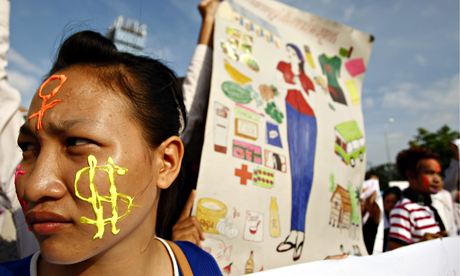"Despite assurances from the government in February, there have since been unprecedented levels of intimidation, violence and a declining respect for the rule of law, which together constitute a grave attack on union and worker rights.
"The concerted message from global unions and brands to the Cambodian government is clear: political stability and respect for human and worker rights are essential to maintaining sourcing in Cambodia."
Clothing retailers challenge Cambodian factory conditions
Firms such as H&M, New Look and Inditex to meet Cambodian government to seek better treatment of garment factory workers
Guardian (UK) | 22 May 2014

A Cambodian garment factory worker at a rally in 2013 demanding better pay and conditions. Photograph: Heng Sinith/AP
Retailers including H&M, New Look and Zara
owner Inditex are to meet the Cambodian government early next week to
seek better treatment of clothing factory workers in the country.
The meeting, which will also be attended by international union IndustriALL, comes as workers campaigning for an increase in the national minimum wage and improved conditions in factories have faced detention and intimidation in a country where few trade unions operate. A series of mass faintings at clothing factories have also highlighted poor conditions.
IndustriALL's general secretary, Jyrki Raina, who
will be attending the meeting and also representing the ITUC and Uni
Global Union, said: "Despite assurances from the government in February,
there have since been unprecedented levels of intimidation, violence
and a declining respect for the rule of law, which together constitute a
grave attack on union and worker rights.
"The concerted message
from global unions and brands to the Cambodian government is clear:
political stability and respect for human and worker rights are
essential to maintaining sourcing in Cambodia."
In
the past few months striking garment workers, who want the monthly
minimum wage to double to $160, have faced brutal action by police with
at least five workers left dead. Some workers involved in the protests
have been dismissed and some factory owners have responded to protests
with lawsuits against union leaders.
An estimated 400,000 people,
mostly women, work in Cambodia's garment factories which are the
country's biggest export earner. Brands have warned that unrest caused
by poor treatment of workers threatens Cambodia's future as a "stable
sourcing location". Pressure on retailers to ensure the safety of
factory workers has also increased in the wake of the Rana Plaza factory collapse in Bangladesh in 2013 in which more than 1,100 workers died.


No comments:
Post a Comment